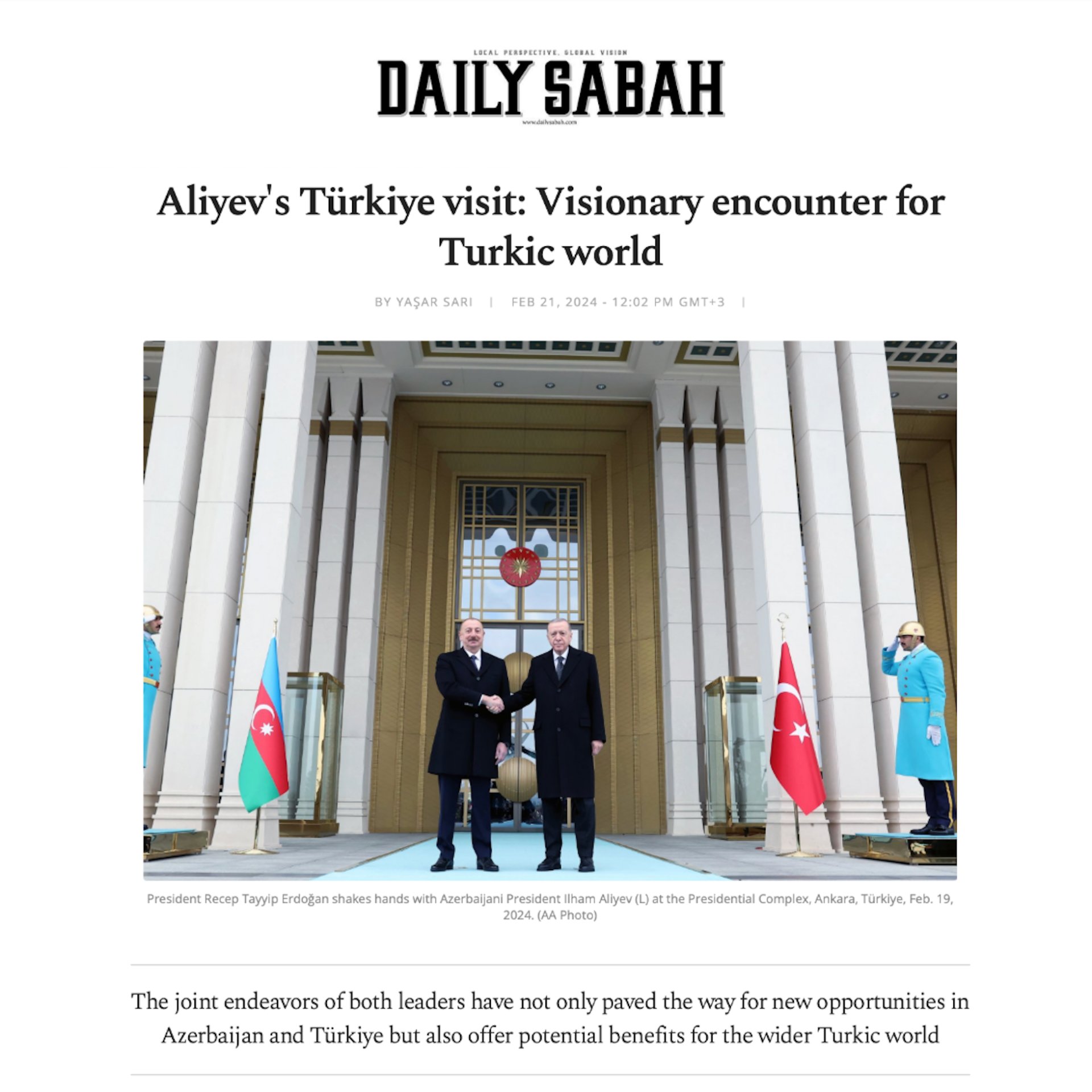


The recent visit of Azerbaijani President Ilham Aliyev to Ankara marks a significant diplomatic event, particularly in light of his reelection in early February. Notably, this trip holds symbolic importance, underscored by the solid messages exchanged between Aliyev and President Recep Tayyip Erdoğan, culminating in the signing of substantial agreements. Aliyev's choice of Türkiye for his inaugural foreign visit post-reelection, akin to Erdoğan's visit to Azerbaijan following his own reelection in June 2023, underscores the depth of the relationship between the two nations. Aliyev underscored the robust ties between Türkiye and Azerbaijan during the visit, emphasizing their pivotal role in the Turkic world and Eurasia. The meetings between the two leaders not only addressed vital bilateral issues but also touched upon broader regional concerns, resulting in the signing of significant agreements.
In his post-election acceptance speech, President Aliyev reaffirmed Azerbaijan's commitment to cooperation within the Turkic world, highlighting the importance of relations with Türkiye. Notably, Aliyev lent his full support to Türkiye's stance on the Cyprus issue, a matter of considerable sensitivity for Türkiye. Additionally, Aliyev's announcement of inviting the president of the Turkish Republic of Northern Cyprus (TRNC) to the upcoming Organization of Turkic States summit in July 2024 in Susha, Azerbaijan, underscores Azerbaijan's dedication to fostering inclusive dialogue within the Turkic community. During the joint news conference with Erdoğan, Aliyev emphasized the significance of collective action and close cooperation within the Turkic world, stressing the potential positive impact on all member states of the Organization of Turkic States (OTS).
Following Azerbaijan's success in the 44-day Karabakh War and subsequent anti-terrorist operations, the nation has embarked on a path toward reconciliation and peaceful coexistence, particularly with Armenia and Iran. Türkiye's unwavering support for Azerbaijan, both during and after the conflict, underscores the shared strategic objectives of the two countries.
Positive developments, such as the continued diplomatic dialogue between Azerbaijan and Armenia at the highest levels, the successful exchange of prisoners of war and steps toward mutual recognition of territorial integrity, reflect progress toward lasting peace. Despite Azerbaijan's relative satisfaction with current conditions, pursuing enduring peace with Armenia remains paramount. For instance, Aliyev's recent meeting with Armenian Prime Minister Nikol Pashinyan, facilitated by German Chancellor Olaf Scholz at the Munich Security Conference on Feb. 17, underscores Azerbaijan's commitment to dialogue and reconciliation. However, significant obstacles persist, including signing a peace agreement following the protocol in November 2021 and the unresolved issue of the Zangazur corridor, alongside Armenia's proposal of "Peace Corridors," which present significant challenges to regional stability and prosperity.
On the other hand, European countries, particularly France, have provided military assistance to Armenia and, in conjunction with the United States, have actively dissuaded Armenia from signing a peace agreement with Azerbaijan. Pashinyan's recent statements identifying the United States, France, Georgia and India as potential security partners, excluding Russia and Iran, signify Armenia's intention to cultivate closer ties with these nations while distancing itself from its traditional allies, Russia and Iran.
Another significant diplomatic development transpired at the Parliamentary Assembly of the Council of Europe (PACE) in October 2023. Samad Seyidov, the head of Azerbaijan's delegation to PACE, characterized the October 2023 resolution titled "The Humanitarian Situation in Karabakh" as biased, asserting that Azerbaijan rejected the decision due to its inconsistency with the realities on the ground in Karabakh. The Turkish delegation at PACE echoed Azerbaijan's stance during the meeting. However, given European parliamentarians' majority endorsement of the decision, discussions regarding Azerbaijan's future membership in the Council of Europe have intensified. Additionally, in January, PACE voted to reject the certification of the Azerbaijani delegation's credentials, citing failures to fulfill specific commitments within the Council of Europe membership framework. Hence, during the news conference with Aliyev, Erdoğan affirmed Türkiye's commitment to safeguarding Azerbaijan's rights and reputation within PACE, vowing to persist in supporting Azerbaijan until the decision regarding the credentials is reversed.
Erdoğan also emphasized that the full sovereignty of Azerbaijan over the Karabakh lands presents a historic opportunity for achieving lasting peace in the region, underscoring the imperative of preserving this window of opportunity.
Both leaders expressed satisfaction with the recent expansion of commercial relations and investments between Türkiye and Azerbaijan, culminating in a record trade volume of $7.5 billion (TL 232.35 billion). They pledged to expedite efforts to achieve the $15 billion target in commercial relations. Additionally, establishing the Türkiye-Azerbaijan University represents another significant milestone, with both leaders highlighting its potential to enhance educational collaboration between the two countries.
Aliyev has adeptly leveraged Azerbaijan's strategic advantages, including its geographic location and abundant natural resources, alongside successful diplomatic engagements with Russia and Iran. President Erdoğan's adept diplomacy and military strategies have bolstered Türkiye's position in the Caucasus. The collaborative efforts of both leaders have not only opened new avenues for Azerbaijan and Türkiye but also held promise for the broader Turkic world.
Source: https://www.dailysabah.com/opinion/op-ed/aliyevs-turkiye-visit-visionary-encounter-for-turkic-world